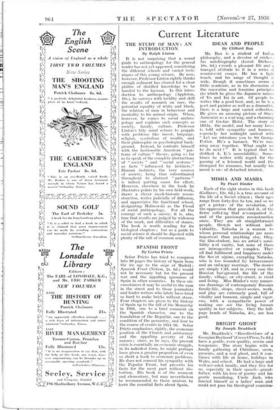THE STUDY OF MAN : AN INTRODUCTION By Ralph Linton
Current Literature
It is not surprising that a sound guide to anthropology for the general reader has not yet appeared, considering the different schools and varied tech- niques of this young science. By now, however, Professor Linton rightly thinks enough sediment has cleared for a clear philtre of distilled knowledge to be handed to the layman. In this intro- duction to anthropology (Appleton, 16s.), he surveys with lucidity and skill the results of research on race, the potential equality of white and black, the relation of man in behaviour and mentality to his animal origin. When, however, he comes to social anthro- pology and explains such concepts as society, family, culture, Professor Linton's tidy mind refuses to grapple with problems like incest, language, religion, symbolism of wealth, and their philosophic or psychological back- ground. Instead, he contents himself with the fashionable American " pat- terns of culture " theory, going so far as to speak of the complete abstractions of " society " and " social systems " as facts " influenced by instincts." Human instincts, the very sources of society, being thus subordinated throughout to abstract " patterns " is indeed putting cause for effect. However, elsewhere in the book lie illustrates points by his own field-work, draws a clever mock-historic recon- struction, writes judicially of diffusion, and appreciates the functional school, designating Malinowski as the Freud of social anthropology. For all the courage of such a survey, it is, alas, true that results are judged by wideness of the mark, not difficulties of stance. The book is worth reading for its biological chapters ; but as a guide to social science it should be digested with plenty of the salt of common sense.














































 Previous page
Previous page